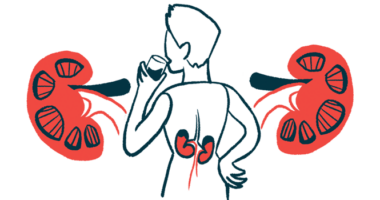Enzyme replacement therapy safe in pregnancy for Fabry patient
Woman had no complications with ERT use during 2 pregnancies, per report

A woman in her 20s with Fabry disease was safely treated with agalsidase alfa — a commonly used enzyme replacement therapy (ERT) — during her two pregnancies with no resulting complications, a case study reported.
During the first pregnancy, “we did not observe any adverse event on administration of ERT,” the authors wrote, noting that agalsidaz alfa “was continued during her second pregnancy.”
The patient also did not experience any problems for several years after the birth of her second child.
According to the authors, this case confirms previous reports supporting the use of ERT during pregnancy.
The case, “Two successful pregnancies in a woman with Fabry continuing enzyme replacement therapy,” was published as a letter to the editor in the journal Therapeutic Apheresis and Dialysis.
Woman treated with enzyme replacement therapy agalsidaz alfa
Fabry is caused by mutations in the GLA gene, which provides the instructions for making an enzyme called alpha-galactosidase A (alpha Gal A). The mutation causes low to no levels of the alpha Gal A enzyme, which triggers the toxic accumulation of fat molecules — Gb3 and lysoGb3 — across several organs, such as the heart, kidneys, nervous system, eyes, and skin.
Enzyme replacement therapy, simply known as ERT, is the standard treatment for Fabry disease. It delivers a lab-made version of the alpha Gal A enzyme directly to a patient’s bloodstream, restoring its function. However, whether ERT can be safely used during pregnancy in women with Fabry is still a matter of debate.
Now, two clinicians at the University Faculty of Medicine, Turkey, described the case of a woman prescribed agalsidase alfa during both of her pregnancies. This ERT is not approved in the U.S. but has won approval in the European Union and other countries worldwide under the brand name Replagal.
The woman, whose age was given as 28, experienced intermittent abdominal pain that gradually worsened for four years. Her mother, a 49-year-old woman, also was diagnosed with Fabry and treated with agalsidase alfa.
According to the clinicians, the patient had the same GLA mutation as her mother, and also started treatment with agalsidase alfa — at a dose of 0.2 mg/kg every 14 days — for abdominal pain. The treatment resolved her symptoms.
About 10 months after starting on enzyme replacement therapy, the woman became pregnant and her pregnancy developed normally. The patient gave birth to a baby boy by vaginal delivery at 37 weeks. During gestation, a prenatal test confirmed the baby was negative for the GLA mutation. No adverse events linked to the ERT during her pregnancy or lactation were reported.
Standard tests on the baby, conducted immediately after birth. also showed no abnormalities. The baby was breastfed and developed normally.
As in previous reports reporting similar results, we can say that pregnancy may not affect FD [Fabry disease] course, and continuing ERT during pregnancy was safe in women with FD.
Two years later, the woman once again was pregnant. Routine ultrasound checks confirmed the fetus was normal. Agalsidase alfa at the same dosing was continued throughout the pregnancy, which occurred without complications.
The woman delivered a healthy baby at 37 weeks. No prenatal genetic tests were conducted due to the parents’ refusal. The baby developed normally and also was breastfed.
The patient was followed for three years, during which no symptoms were observed. Ultrasound tests of the heart, as well as blood and urine work, were uneventful.
“As in previous reports reporting similar results, we can say that pregnancy may not affect FD [Fabry disease] course, and continuing ERT during pregnancy was safe in women with FD,” the researchers concluded.







